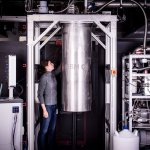How quantum computers could help tackle big climate change challenges

- By 2025, quantum computing “will have outgrown its infancy”, with commercialization spurring a new generation of technologies
- Quantum computers hold the key in realizing green solutions that can accelerate the goal of carbon neutrality by 2050
Over 60 countries have pledged to reduce their net carbon emissions to zero by 2050, according to the United Nations. Among those in the green list, the UK has codified the net-zero goal into law, and other European counterparts such as Norway and Finland have pushed forward the aim of achieving carbon neutrality by 2030 and 2035 respectively.
Besides commitment from countries, members of society and businesses are also changing their ways and cultivating green habits to join the effort in eliminating carbon footprint. To realize the net-zero goals, individual and collective effort is crucial, and the widespread practices of massive carbon management will be key.
In the fight against climate change, a plethora of new technologies will be required to not only transform conventional approaches that are contributing to world carbon emission but also birth a new generation of green technologies.
The World Economic Forum (WEF) stated by 2025, quantum computing “will have outgrown its infancy,” and we’ll see a fist generation of commercially available quantum-inspired devices to “tackle meaningful, real-world problems.”
Chemistry is one area that is highly anticipated to be revolutionized by the developments of quantum computers. In a virtual tech event, Quantum.Tech Digital Week, an expert estimated that within the next decade, quantum computers will play a major role in creating the chemicals needed to make energy-efficient fertilizers and drastically slash carbon emissions.
Jean-François Bobier, a Boston Consulting Group partner, shared in the online conference the potentials of quantum computers in creating molecules that could replace chemical catalysts needed for fertilizer production.
The existing catalysts consume 3 to 5% of global natural gas and cost up to US$300 billion a year. The environmental cost? It’s said to be responsible for 2% of annual worldwide carbon dioxide emissions, Bobier explained.
The emergence of quantum computers is about to change the tide. While classical computers, which run in bits of zeroes and ones, would take more than 80,000 years to model the molecules needed to replace these chemicals, quantum computers that process information in qubits (within the spectrum between ones and zeros) could take just one day to accomplish the task in question.
Quantum computers are apt for the development of catalysts because it provides a microscopic understanding of the enzymes that underlie photosynthesis and the nitrogen cycle. The technology could also unlock the development of high-temperature superconductors and facilitate the scouting of new materials for solar cells that will further consolidate green technologies used in electric vehicles (EVs) and the likes.
Bobier added, while the replacements for the 100-year old catalysts or chemicals needed to synthesize fertilizers may not be carbon-neutral, they will be significantly more carbon-efficient.
Companies across industries are looking towards the future-forward tech to solve the challenges of today and tomorrow. Fertilizer chemical giant BASF is among those in the agribusiness to enlist quantum computing power to analyze new seeds and fertilizers. Meanwhile, aerospace giant Airbus has been advocating for the aviation industry to explore new fields such as AI and quantum computers to create a climate-neutral industry.
CTO of Airbus, Grazia Vittadini, stated, “as aerospace professionals, we all know there is no one single solution to the climate change problem,” as reported in CBR.
German automaker Volkswagen has been testing a quantum-inspired navigation app that will be baked into its vehicles within the next few years. The navigation app uses cloud-based quantum-computing services to help public buses find the fastest route for individuals buses in near real-time. The aim is to prevent road congestion by ensuring the most efficient route is in use.
Though quantum computers are not readily available or commercialized yet, it’s just a matter of time before an explosion of use cases are seen.
“Yes, it will be a long time, and yes, we are going to have to be patient for the use cases, but we need to be prepared now,” Bobier said.










